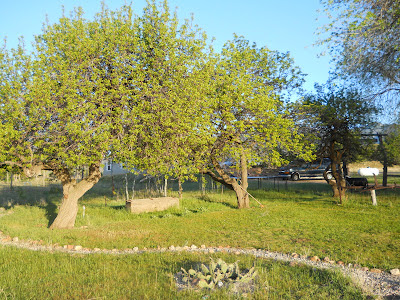 |
Path and apricot trees in Grandpa Joe’s Orchard
|
Times are hard; money is tight; we’ve been through a cold spell, a heat wave and another cold spell. We haven’t been to Dry Creek since spring break, since before this blog was started. And we almost didn’t go this weekend because without telling us, Tyler planned a movie night while we were finalizing our own plans. Marci, like I, didn’t have a social life in high school. But, unlike me, she wants to make sure our children don’t suffer the same fate. I think, hell (that’s heck with spice, my fellow Mormons) if I survived, so can they. But as I’m married, I do whatever my family wants. It’s just easier that way. So, America’s youth descended upon our house Friday night to watch Insidious and I went to bed so that we could leave early Saturday morning.
 |
Everest’s root-beer cake made for Tyler’s previous Movie Night
|
It was worth the wait. We loaded up the ark (Chrystal Blue Persuasion) with the five of us, two dogs, four baby chicks, a bookcase, two boxes of books, suit cases, bags of dirty clothes and 80 bucks of gas. You just can’t do that in a Smart Car, no matter how hard you try. I’m going to miss this van when we eventually downsize.
Highway 89 was beautiful--the Virgin and Sevier Rivers churning with spring melt water even though we only received 60% of our normal snowpack. The meadows were green and the Tushar Mountains were still very white.
Then, I mowed the lawn at the old trailer, which feels like an acre. Other than a very narrow strip at the front of our new house, I’m not planting any more grass, but because of family reunions and history of the property, I’m keeping the lawn at the trailer. The kids love to play football and tag there. In the center is a giant Ash which shades it most of the day. During the heat of the day, camp and lawn chairs slowly move over there.
After that, I mowed the natural grasses--mostly cheat grass--around the old pig shed, which is now a mock western town--hardware store, motel, diner and bar--and then over by Grandpa Joe’s apricot orchard.
 |
The Saloon portion of a pig shed I converted into Wild Turkey Flat, Nevada,
a mock Old West Town
|
 |
| The South entrance to Grandpa Joe's Orchard in memory of my stepdad. |
I ended my workday by making hamburger soup. Thirteen deer stood in the field outside in the dusk as we slurped it down with good rolls. Then the family watched War Horse, as I fell asleep on the family room floor, exhausted.
This morning I was up at six-thirty, ready to cram in an eight-hour work day by 3:00. First, I took our push weed-eater to one of the last stands of wild rye. Once we let the alfalfa die, the entire field was invaded by rye. In the spring, it’s long and green, and on a wet year, almost looks like corn, but I’m incredibly allergic to it, and in the summer it dries out and makes it so you can’t walk anywhere without leaving a horrible-looking pathway of tumbled, bent, broken yellow blades--not too unlike the forest after St. Helens blew her top. It’s also an incredible fire danger.
Fortunately, the Fish and Game department introduced wild turkeys into the area twenty or so years ago, and apparently wild turkeys love wild rye, for each year since their introduction we’ve had less rye. (Insert ADVERTISEMENT FOR TURKEYS HERE). There is only one stubborn rye stronghold left, near the remains of the hay barn, which to my dismay, my parents tore down many years ago. Until last year, I still had the foundation, but the county asked for the concrete for the irrigation pond, and we won’t get into all that as it’s still a sore spot (along with the missing combine, the missing chicken coop, the missing stanchions, and the missing outhouse, which looks great fixed up as a tool shed at another house in town). Okay, okay--forgive and forget least Christ remember every little blot on my record. Anyway, I whacked down the rye before it established its Amazon hold, moved giant, rotting two by eights which were made when 2 x 8s were 2 x 8s. Even now, half buried for many years, they are incredibly heavy.
Then, I took the driving mower to the rest of what we call the island, which was created by our driveway loop.
 |
| The "island," a natural grass area I mow into a lawn--although it's rye and cheat grass. It still looks nice after it turns yellow in late summer. |
On top of this, I watered 25 oaks, seven cottonwoods, one pinion and numerous aspen, as well as a lawn, a rose garden and two flower beds. I also walked up to the upper irrigation pond, turned off the water in the field and routed more water down to the lower pond. I’m tired, but I feel great. I could live my life this way--even if I have to flip burgers at Burger King to make it happen.
Sometimes where you are is more important than what you do. For now, it was a great weekend get-away--just what I needed. Now, I just need to figure out how to get the incredibly rich to pay to be my slave labor. Do you think I can pull off a dude-garden experience? I’m sure everyone laughed at the café when the first rancher said, “You know, I think I’ll charge rich city-slickers an enormous price to come and herd cows for me.” (Insert ADVERTISEMENT for Dry Creek Dude Gardens here.)
 |
Dry Creek Gardens: Plant Memories Forever by Working on a Real Farm |


























